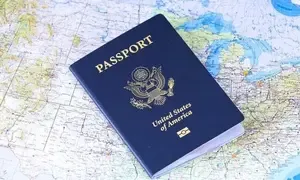Why Did the US Passport Fall Out of the Top 10 Powerful Passports?

Synopsis
Key Takeaways
- US passport is now ranked 12th, falling from the top 10.
- Visa-free access has changed for several nations impacting rankings.
- Singapore leads with 193 visa-free destinations.
- China's progress in passport strength shows a shift in global mobility.
- The US needs to reevaluate its diplomatic strategies to improve its standing.
New Delhi, Oct 14 (NationPress) The US passport has for the first time dropped out of the top 10 most powerful passports globally since the inception of the Henley Passport Index two decades ago. With access to 180 out of 227 countries without a visa, the US, which held the top position in 2014, is now sharing the 12th place with Malaysia.
Retaining the top position is Singapore with visa-free access to 193 destinations, followed closely by South Korea with 190 and Japan with 189, as per the latest Henley Passport Index derived from International Air Transport Association (IATA) data.
The decline in the US ranking can be traced back to several nations altering their access policies. Factors contributing to this drop include the revocation of visa-free entry to Brazil earlier this year, exclusion from China’s expanding list of visa-free countries, as well as new entry restrictions by Myanmar and Papua New Guinea.
Furthermore, Vietnam has recently worsened the US passport's standing by opting to exclude it from its new visa-free program, alongside Somalia introducing an eVisa system.
The UK has also seen a decline, slipping from 6th to 8th place since July, marking its lowest rank since topping the index in 2015.
Currently, only 46 nationalities can enter Washington without a visa, while US citizens enjoy visa-free travel to 180 locations. According to the Henley Openness Index, which assesses how welcoming countries are to foreign tourists, this disparity places the US in 77th place.
In terms of openness, the US has fallen behind Australia and is only slightly ahead of Canada, New Zealand, and Japan.
Conversely, China has made remarkable progress over the past decade, adding 37 more destinations to its visa-free travel list, advancing from 94th in 2015 to 64th in 2025.
With access to 76 nations without a visa—30 more than the US—China now ranks 65th on the Henley Openness Index. This shift reflects Beijing's growing commitment to global mobility and openness, highlighted by recent visa-free agreements with Russia, the Gulf states, several South American countries, and European partners.









